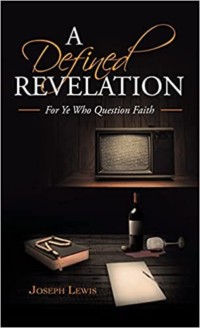Title: A Defined Revelation: For Ye Who Question Faith
Author: Joseph Lewis
Publisher: LifeRich Publishing
ISBN: 978-1-4897-3548-5
Pages: 114
Genre: Religion, Spirituality
Reviewed by: Jason Lulos
Pacific Book Review
What is faith? Maybe it is the belief in something I cannot scientifically prove and/or something that is beyond my intellectual ability to articulate. Some religious people may respond “I believe simply because I choose to believe.” Those more skeptical find themselves stuck at this “leap of faith.” But in A Defined Revelation: For Ye Who Question Faith, author Joseph Lewis acts as philosopher and spiritual guide, giving readers rational arguments for the existence of God and how those arguments support the pursuit of a moral, Christ-like life. It is this unique combination of philosophical reasoning and Biblical exegesis which make this a truly compelling and potentially enlightening book.
Humility is the abiding theme in this book. It is through humility that Lewis offers a proof and a glimpse of the Mind of God and how this actually lends itself toward living a selfless, grateful, and generous life.
Lewis contemplates the particular ability of a mind to create thoughts and images: an ability that seems unexplainable with physical laws. Thus, a mind is or at least participates in the metaphysical. This creative ability of the mind is a glimpse into something higher. A human can create an image of oneself in their mind, but one cannot comprehend their mind creating itself. (Here, even “I think, therefore I am” falls short because it necessarily comes after the creation of that mind.) Therefore, it stands to reason that this would require a much higher mind to have created our minds, thus a higher Creator: God. Lewis implies that our profound humility begins with this acknowledgment: that we did not create ourselves.
Logically following, God’s intellect is infinitely superior. For a human to presume to know everything and/or dismiss God as unprovable is to be irredeemably proud, arrogant, and self-important. Thus, Lewis argues that in admitting our fallibility, we open ourselves to being self-less, humble, more thoughtful of other people, and more grateful for God’s gifts. Quite simply, he is suggesting that by believing in God, we become better people.
Lewis includes a fascinating look at demonology, noting that a demon is, after all, a supernatural fallen angel whose intellect is also vastly superior to ours. Recognizing this, we humbly seek God’s help. Subsequently, we become less interested in physical desires, and more willing to pursue a mental/spiritual relationship with God. Although a highly spiritual and philosophical book, Lewis also gives the reader practical applications and tools to strive towards a Christlike life.
It is clear the author’s intent with this book is none other than helping to save souls. On Earth, we are physically separated from God. But, the spiritual tether is always already there; we just have to have the humility and courage to explore it. Lewis’s proof of God’s existence and the gratitude we should feel is inherently linked to a more generous, ethical attitude in general. This is a truly holistic and insightful argument. Lewis provides scriptural analyses supporting his ideas and even includes a selection of poems which poignantly evoke the sentiments therein.
This is a book the spiritually and philosophically minded person will certainly enjoy. But I think this book particularly speaks to those on the fence. To skeptics and/or those who feel a spiritual lack but are unsure of how to articulate it or go after it, I highly recommend this book.


